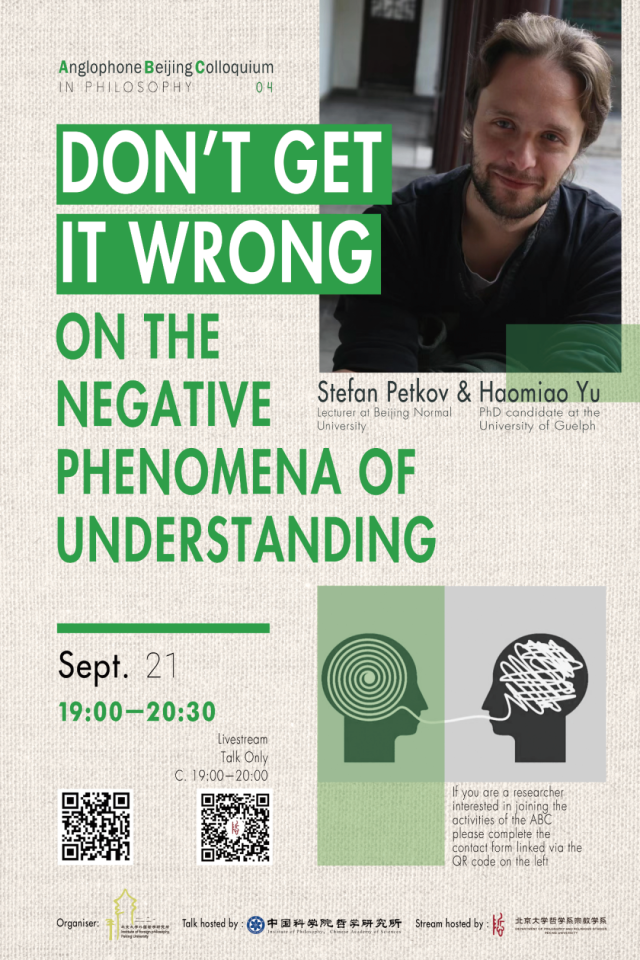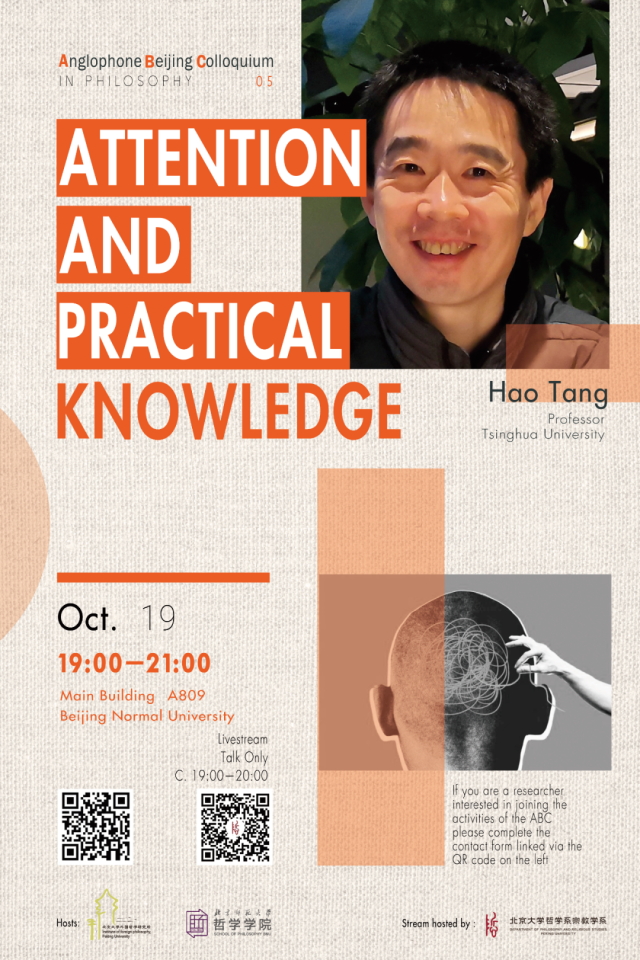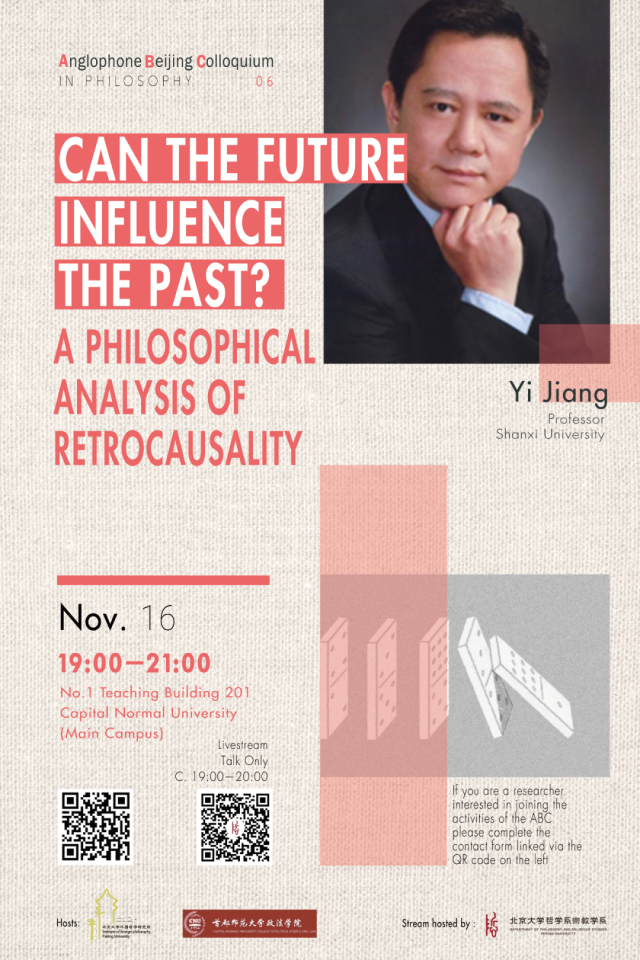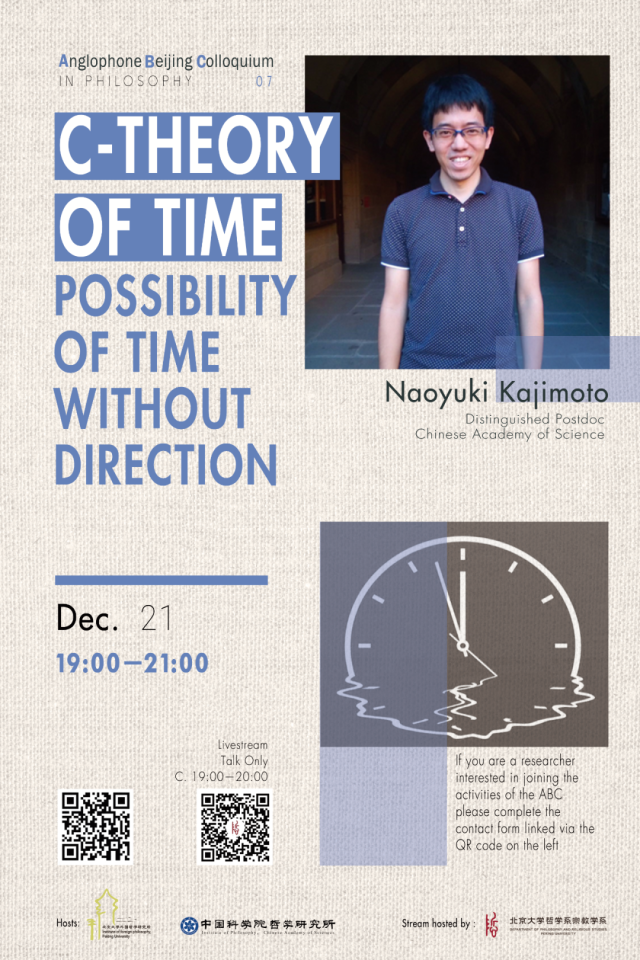09.21–12.21: Anglophone Beijing Colloquium系列哲学研讨会23秋会程
本学期Anglophone Beijing Colloquium系列研讨会已顺利迈入第二阶段。本着促进使用英语的在京哲学学者相互交流合作的目的,ABC系列研讨会将在北京多所高校之间逐月轮转举办。2023秋季学期,中国科学院大学、北京师范大学、首都师范大学和清华大学将依次承办ABC系列研讨会。兹对上述院校协助组织承办本学期研讨会的学者吴东颖、梶本尚敏、代海强、展翼文、Ivan Ivanov和蒋运鹏致以特别感谢。
本学期共有四次ABC研讨会,下一次会议将于11月16日周四举办。全部四次会议的具体信息请见下方海报与简介。
ABC系列哲学研讨会面向以英语为工作语言的在京哲学学者,在Sebastian Sunday、Ivan Ivanov和蒋运鹏的提议下创立,由北京大学外国哲学研究所牵头,与其他在京高校协同举办,旨在为北京各院校系所的英语哲学学者搭建分享、交流、联络的平台。欢迎感兴趣的在京学者与学生参与活动。
ABC系列哲学研讨会的主讲内容将在北京大学哲学系宗教学系微信视频号平台进行全程直播,同时通过北京大学外国哲学研究所B站官方账号提供录播。
ABC系列哲学研讨会 04

主讲内容摘要
This paper studies the negative phenomena of understanding in relation to scientific explanations. We make a distinction between genuine understanding, lack of understanding, and misunderstanding. We define explanatory understanding as inclusively as possible, as the epistemic success that depends on abilities and skills and correct explanations. This success, we add, is often supplicated by specific positive phenomenology which plays a part in forming epistemic inclinations - the tendency to receive an insight from familiar types of explanatory information. We define lack of understanding as the epistemic failure that results from a lack of an explanation or an incorrect one. In turn misunderstanding is characterized by cases where one’s epistemic inclinations do not align with an otherwise correct explanation. This is illustrated by a short meta-philosophical study on the current debates about distinctively mathematical explanations.
ABC系列哲学研讨会 05

主讲内容摘要
Practical knowledge, in the sense made famous by G. E. M. Anscombe, is “the knowledge that a man has of his intentional actions”. This knowledge is very ordinary, but philosophically it is not easy to understand. One illuminating approach is to see practical knowledge as a kind of self-knowledge or self-consciousness. I offer an enrichment of this approach, by (1) exploiting Gilbert Ryle’s discussion of heeding (that is, paying attention), in particular paying attention to one’s own intentional action, and (2) constructing and applying a practical analogue of Kant’s apperceptive “I think”. Combining (1) and (2), I offer an argument for my main claim: paying attention to what one is doing is an exercise of practical self-consciousness – it is how practical self-consciousness gets “schematized”.
ABC系列哲学研讨会 06

主讲内容摘要
Huw Price and Ken Wharton claimed recently in their paper published in the Conversation, a well-known blog, that quantum mechanics shows that the future can influence the past. According to their paper, many scientists are convinced about it. However, there is still something mystical for philosophers. The first is about the definition of Retrocausality and its relation to causality philosophically. Second is concerned with understanding the relation of cause and effect, not only scientifically but also logically. In this talk, I will answer the two questions by analyzing the concept of temporality and by examining the counterfactual and overdetermination. I found a tension in understanding the concept of necessity in the physical and logical sense. Finally, I will argue that the time reversal asymmetry does not imply Retrocausality, and the phenomenon of Retrocausality does not exist in reality but only in logic.
ABC系列哲学研讨会 07

主讲内容摘要
In philosophy of time, there are two major positions; A-theory and B-theory. Although they disagree with various issues, both assume that time must have objective direction. Recently some philosophers such as Price (1996) and Farr (2021) challenge this assumption and propose C-theory, according to which there is no objective temporal direction. The aim of this talk is to explain and motivate C-theory. First, I explain what C-theory is by clarifying the difference between B-theory and C-theory and what it means for time to have a direction. Second, I motivate C-theory by presenting some argument against B-theory.



